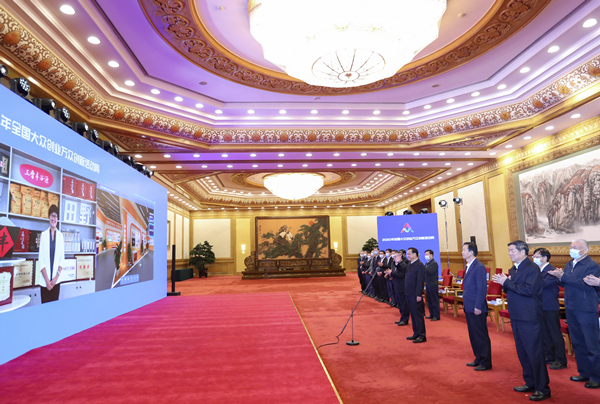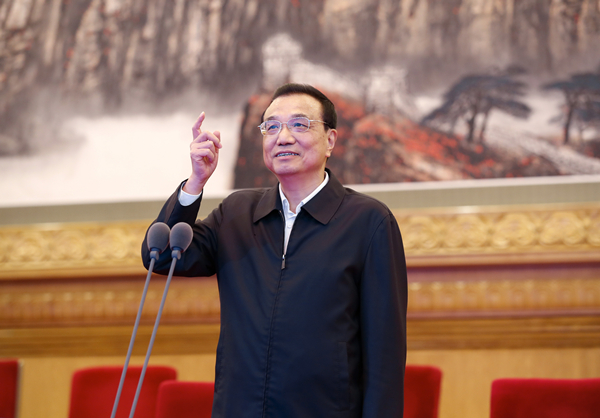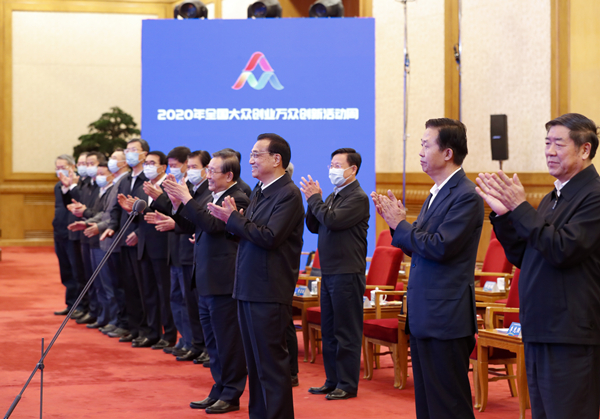As national mass entrepreneurship and innovation week kicked off on Oct 15, Premier Li Keqiang talked with three entrepreneurs via video link from the Great Hall of the People in Beijing.
"We hope to invite Premier Li to Shanxi to enjoy authentic Shanxi-style millet congee and steamed millet," said Hao Weifang, general manager of Fengguyuan Agricultural Development Co in North China’s Shanxi province.

Hao started her business back in her hometown in 2016 by leading local fellow farmers to plant selenium-rich black millet. The business has not only boosted modern agriculture in her hometown, but also largely increased the farmers’ incomes.
Premier Li applauded her contribution to overcoming poverty and increasing income in the village, adding that he would love to accept her invitation and that he looked forward to having porridge made of Hao’s millet in Beijing.
The Premier asked Hao what difficulties she had encountered. She said that her company pulled through the difficulties as it gradually grew, with improving business environment and more preferential policies.
"Beginnings are always tough. With a good start, I believe you can overcome more difficulties in the future," Premier Li said.
Then the Premier talked with Wang Anli, chairwoman of Sangeayi.com, an information technology firm in the housekeeping industry. Wang started their conversation by looking back on the company’s achievements.
She and her husband, Yu Fangming, started their business by building an Internet Plus housekeeping service platform in 2015. The platform is aimed at developing smart housekeeping services and serves as a bridge between customers and housekeeping service companies. Their business has created hundreds of thousands of jobs in five years.
"By offering hundreds of thousands of jobs, you must have offered a helping hand to at least the same number of families," the Premier said.

The company strives to meet market demands for caretakers for newborns and senior citizens, as well as domestic work helpers for middle-aged people, Wang said.
Premier Li acknowledged her enterprising spirit and said that the housekeeping industry, as part of the service industry, is always a sunrise industry: People always need such services no matter what stage of life they’re in, making it an enormous market with great potential.
"You have targeted the market by meeting people’s actual demand. Your spirit can inspire local governments to offer more sufficient and qualified services aligned with people’s demands," said the Premier.
The last entrepreneur to talk with the Premier was Zhang Zhi, a 25-year-old who graduated from university only a few years ago. He is now chairman and general manager of Nanke Materials. Zhang introduced his entrepreneurial experience and showed his company’s innovative products to Premier Li.
One of Zhang’s products is a special wet tissue containing hydrophilic nanomaterials designed to prevent medical goggles from fogging up. The effect can last for a long time, and the tissue is also capable of disinfection.
"During this year’s COVID-19 outbreak, we spent three days improving our technology and seven days arranging production expansion. Then we donated some related products to the front lines of the anti-epidemic fight in Wuhan to help safeguard the eye health of medical personnel and ensure their work efficiency. We managed to contribute to the battle against the virus through technological services," Zhang said.

Zhang told Premier Li that he decided to start a business in developing and industrializing new materials in 2016, when he attended the 2nd National Mass Innovation and Entrepreneurship Week in Shenzhen. Premier Li also attended that event.
The Premier also learned that Zhang had benefited from favorable policies advocating the commercialization of research findings. Calling Zhang’s career a meaningful undertaking, Premier Li said that his success would encourage more university graduates to engage in innovation and entrepreneurship.
When asked about the difficulties he encountered, Zhang said it would be great if society at large could be more patient and positive toward startups, especially those established by young people. Also, he said that greater support and patience from the government are essential for an increasing number of tech enterprises with a relatively long commercialization period of research findings.
Premier Li heard his advice and said that both the government and society should help startups.
"The government will issue more favorable policies for startups, who are expected to work even harder to ensure product quality with their perseverance and enthusiasm," said the Premier.